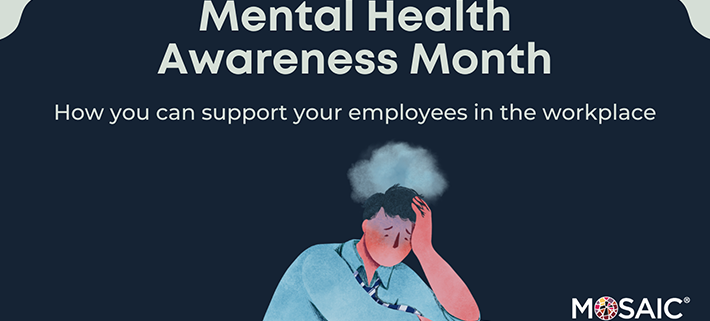How to Support Mental Health in the Workplace
In the United States, mental health issues are prevalent, with one in five adults experiencing mental illness in any given year. This includes conditions such as anxiety disorders, depression, bipolar disorder, and schizophrenia. Furthermore, research has shown that employees who experience stress and burnout are more likely to suffer from depression and anxiety.
If you needed more reason to support mental health in the workplace than the employee’s overall well-being, it is reported by the World Health Organization (WHO) that depression and anxiety disorders alone cost the global economy an estimated $1 trillion per year in lost productivity.
Therefore, supporting mental health in the workplace can benefit both the individual employee and the organization as a whole. By prioritizing mental health, employers can reduce absenteeism and presenteeism, improve employee morale, and foster a more positive and productive work environment.
May is Mental Health Awareness Month, a time to raise awareness of the importance of mental health and reduce the stigma surrounding mental illness. Supporting mental health in the workplace is an excellent way to contribute to this effort. Employers can use this month to initiate mental health awareness campaigns, provide mental health resources, and promote open communication about mental health issues.
Here are some ideas to get you started:
- Encourage open communication: Encouraging employees to discuss their mental health concerns without fear of stigma or retribution is essential. Create a culture of open communication by regularly checking in with employees and providing them with safe spaces to discuss their mental health.
- Provide mental health resources: Providing mental health resources, such as Employee Assistance Programs (EAPs) or access to mental health professionals, can make a significant difference in the lives of employees struggling with mental health issues.
- Offer flexibility: Allowing employees flexibility in their work schedules or remote work options can help reduce stress and anxiety. Flexibility can also help employees manage their work-life balance, leading to better mental health outcomes.
- Promote self-care: Encouraging employees to prioritize self-care can be an effective way to support mental health in the workplace. This can include providing mental health days, offering yoga or meditation classes, or promoting healthy eating habits.
- Create a positive work environment: Creating a positive work environment that promotes inclusivity, diversity, and respect can also support mental health in the workplace. Employees who feel valued and supported are more likely to have better mental health outcomes.
- Educate employees: Educating employees on mental health issues, including symptoms, warning signs, and treatment options, can help reduce the stigma surrounding mental health and encourage early intervention.
- Lead by example: Leaders and managers play a crucial role in supporting mental health in the workplace. They can lead by example by prioritizing their mental health, modeling open communication, and promoting a positive work environment.
Supporting mental health in the workplace is essential for the well-being of employees and organizations. By prioritizing mental health, creating a supportive work environment, and promoting self-care and education, employers and employees can work together to support and improve mental health outcomes.




